Stuart Millard's Blog, page 7
September 18, 2023
Ultra Quiz ’85: Encounters at the End of the Pier
…
This video first appeared on my Patreon, where subscribers could watch it a month before it landed here. If you’d like to support me for as little as £1 a month, then click here to help provide the world with regular deep dives about weird-bad pop culture, early access to my podcast and videos, and all kinds of other stuff.
There’s over 660,000 words of content, including exclusives that’ll never appear here on the free blog, such as 1970’s British variety-set horror novella, Jangle, and my latest novel, Men of the Loch. Please give my existing books a look too, or if you’re so inclined, sling me a Ko-fi or some PayPal cash.
Whizzkids Guide
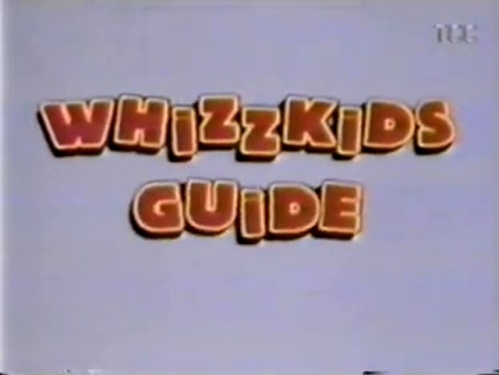
For every junior-aged kid, there’s something which looms overhead like a coming storm. Someday, unavoidably, you’ll be starting Big School; a bigger building filled with bigger boys. Having fit that demographic myself in the eighties, my expectation was coloured by portrayals, often written by ex-public schoolboys, as post-war landscapes of pet frogs in pockets, japes and pranks, and history masters in mortar boards doling out canings. From Billy Bunter to The Beano to Skool Daze on the ZX Spectrum, I expected to be issued a little red cap and lyrics to the school song on my first day, trusty catapult secreted in my back pocket, but of course, found myself in a place closer to Grange Hill or Kes. Or HBO’s Oz.
A big perpetrator of this jolly archetype was the Whizzkids Handbooks. Though published by Armada, Whizzkids felt like an Usborne idea; a kind of school-set sister brand to their Spy’s Guidebooks, alongside which they sat on my shelves, with writer Peter Eldin also penning Armada’s rival series, The Secret Agent’s Handbook. Three volumes of Whizzkids acted as invaluable guide for that coming storm; rebellious tomes of secret knowledge on how to not just survive big school, but get one up on teachers and parents — plus riddles, puzzles and word searches. A sort of junior Anarchist’s Cookbook, such was their popularity, within a year of publication, an adaptation was on the air. Debuting on Southern on April 1st 1980, Whizzkids Guide was a series so niche and terrible, even Network didn’t touch it before their sad tumble into administration.

Eldin would be sole credited writer for the TV version, which retained the defiant ‘down with teachers!’ theme of the original, rendering it mildly scandalous to more staid and sensible grown-ups, like CITV’s punky teenage sketch show Your Mother Wouldn’t Like It would, five years later. I’ve been working out of a cafe lately, and though I’ve got headphones on, people often walk past my screen and see, say, Barry off EastEnders being hypnotised, or Andi Peters doing a soft shoe shuffle. This one, I watched at home, as I really didn’t want to try and explain why Arthur Mullard was squashed into a school uniform.
It’s certainly interesting casting, a group of eleven-year-olds portrayed by literally elderly actors, with Mullard 70, and Rita Webb — hair in pigtails, lollipop permanently in hand or gob — 76 at the time of filming. Sheila White from Oliver!, a comparatively youthful 32, is given the St. Trinians aesthetic, baby-doll voice and blonde hair in bunches, but thankfully they never go down that nudge-nudge path of School Disco paed titillation. Rounding out the cast, saving the best for last, is Kenneth Williams. Kenny was 54 at the time, but always had the vibe of a naughty schoolboy anyway, which is probably what drew me to him as a child, as one of my very first — and everlasting — favourites. Patrick Newell is the lone put-upon teacher, though the cast occasionally double up as teachers and dinner ladies.
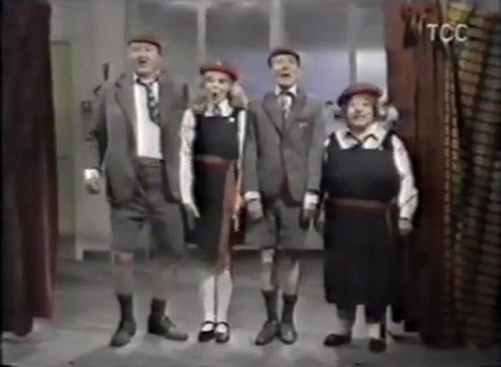
There’s a sense of the forbidden from the beginning, each episode starting with a warning from a bespectacled boy — the cast’s lone actual child — that the following is unsuitable for children or adults of a nervous disposition, advising them to leave the room. But essentially, this is a mix of skits, bar bets, and rotten jokes-for-kids, plus some truly unexpected variety. Adapted from books where most sections run no longer than half a page, it moves at quite the clip over its twenty-minute duration, with a panicked sense to the editing, often cutting halfway through the final word of a scene, hurriedly overlapping into the next bit. Sketches consist of joke-book style material; a teacher calling a pair of latecomers ‘the two musketeers,’ “because you must-get-‘ere on time!” and MasterTwit sections running through every available pun on a given subject — “What fish are you likely to find in a bird cage?” “A perch.” The classroom set’s pleasingly comic-strip, with Teach’s mortar board present and correct, all sat at those old-fashioned desks which one could hide a mouse in, and with a blackboard wearing two words from a later sketch — CENTIMETRE GRUESOME — aka a description of your dad’s cock.
Just as the books, everything relies on playground logic traps nobody would ever fall for, albeit clean ones and not “have you ever touched a BMW?” which is a shame, because I’d love to see Kenneth Williams accuse Arthur Mullard of being an African Bum Cleaner. The loopholes and literalism are at their worst during Mullard’s bar bet type gags; wagering White she can’t lift a cup using a balloon, or that he can make Webb say ‘green’. A teacher’s challenged with buttoning up his jacket in ten seconds — “You buttoned it down, you didn’t button it up!”
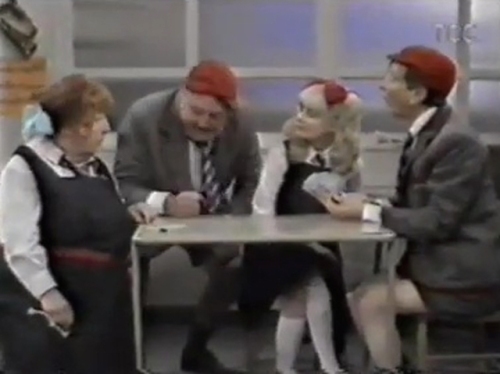
The books and show play to that childhood fantasy of putting an adult in their place with your big brain, leaving them seething and humiliated, so there’s lots of ‘proving’ sums wrong — “Please sir, I can prove that 3 plus 3 equals 8!” or “Please sir, I can prove that 19 takeaway 1 is 20!” In the latter, 19’s written on the board in Roman numerals — XIX — with the middle I rubbed out, leaving XX, presumably forcing any teacher who fell for it so mortified, they’ve no choice but to hand in their resignation. In the Whizzkids world, teachers are easily defeated creatures of habit, with the series functioning as equivalent to a Gamefaqs guide for beating an end of level boss.
As a Beano-reading lad, I had a notebook with ‘ULTIMATE DODGE GUIDE’ scrawled on the cover, containing a hand-written collection of Roger the Dodger’s weekly dodges, and had I seen this show, I’d have been all over their How To Cheat At sections. There are sneaky scams for topics like writing lines or cheating at exams, with the latter suggested pupils write answers on the inside of an eyepatch, at least giving us Kenneth pulling a funny face, before bumping into a teacher after doubling up with two. If that doesn’t work, write the answers on your friend’s back. Then again, anyone who read the Young Ones book knows there’s a better way of cheating. Right kids?!
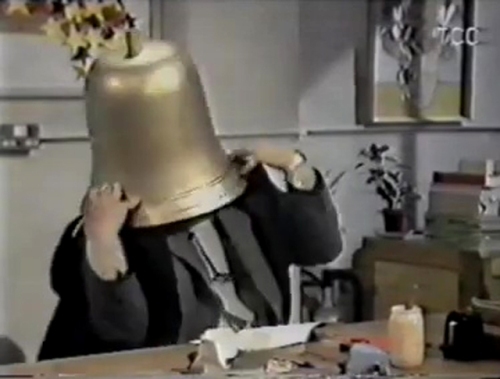
Just two minutes into the first episode, the Dingbats acrobat troupe show up yet again on this Patreon for some pre-taped tumbling, with another routine of pommel horse-vaults in fancy dress under comedy honks and whistles. Everything’s broken up with very short animated segments, slightly Python-esque in their silly anarchy; a pupil getting completely covered with an enormous dunce cap; a dinner gong cracking as it’s rung; a monster quaking in fear while reading a book of horror stories. Fights are clouds with fists and feet poking out, and words like BASH and BIF, and teeth fall from the mouths of overweight schoolboys — one of whom, thanks to a G resembling a C, I initially thought was carrying a sack of cum.
The boffin from the opening periodically shows up, sat behind stacks of leather-bound books to share ‘interesting trivia’. He doesn’t interact with the rest of the cast, solely reeling off zingers from American presidents, reading out letters from the Scientific American in 1865, or excerpts of savagely bad school reports, revealing the subject grew up to become Einstein or Emlyn Hughes. These are breathlessly nervous deliveries, never making it through a segment without falling over his lines, (“salt was velly valuable commodity”) and the choice of topics lacks any connective thread, veering from the word juggernaut‘s country of origin, to a piece about the Indian rope trick — “modern magicians believe it is merely a traveller’s tale.” As a rope in his hand snakes its way to the ceiling, he asks “is there an Indian boy handy?”
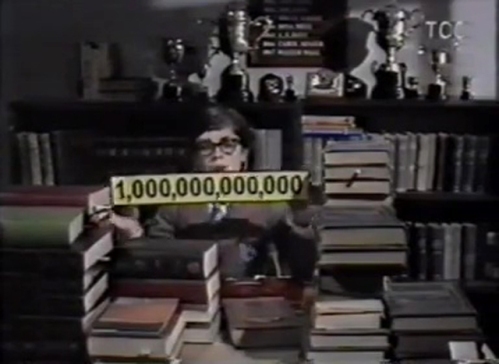
Most incongruous are the weekly songs from extremely wacky comedy folk jug band The Brownsville Banned, who were once agented by Jasper Carrot; songs like My Identikit Girl, about a copper assembling a photofit of his dream woman, backing singers in helmets adding “allo allo allo allo!” In a complete bubble outside the rest of the show, filmed on a normal stage and not the school set, they seem like they’ve been accidentally cut in from another tape, all wigs and funny waistcoats, presumably with the thinking “they’re silly, so kids will like it.” During one honest-to-god toe-tapper, as a singer strums away on a mandolin, another band member baits a fishing rod at the side of the stage, lifting the singer’s hat off to reveal a plastic bald wig adorned with an X of two sticking plasters, before filling the hat with orange juice and glugging it down. One number’s about Cairo, all in sheik head dresses — “sand bags, wind bags, camels with the hump; fat girls, thin girls, some are looking plump” — with the singer dropping his trousers, though the camera stays ankle height.
And then it’s back to the classroom and “Who can name two days of the week beginning with T?” “Today and tomorrow!” and a Mullard MasterTwit where time stands still. With such yawning great pauses between lines, you think he’s died in the chair like Sid James, poor paramedics having to heave him onto a stretcher by the blazer. Honestly, there is a guilty pleasure in this great big bull of a man not adjusting his manner at all in portraying a schoolboy, growling infant one-liners in his regular Yus, My Dear voice, veiny old legs hanging out of shorts, red cap balanced on the pumpkin he calls a noggin. “What do you get when you cross a mouse with an elephant?” “GREAT BIG ‘OLES IN THE SKIRTING BOARD.” “What is a metronome?” “THAT’S A DWARF ON THE PARIS UNDERGROUND.”
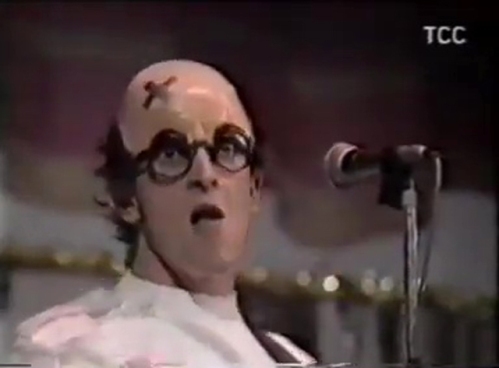
The lack of laugh track leaves all these hoary old gags DOA, but I have to remind myself this was aimed at children, some of whom may have laughed, at least in recognising the cadence of a joke, if not understanding it; the sort of uneducated eight-year-olds who don’t know what the Paris underground network’s called. Idiots! But I have to single out a couple of extraordinarily bad ones. “Why is an empty jug like a road vehicle? Because it’s a jug o’ naught!” and “Why do we buy clothes? Cos we can’t get em for nuffink!” Lines like that are probably what finished off Danny Kendall.
Mullard’s a peculiar presence at the best of times (“Everyone else in the world says ‘yes’? Then I’ll say YUS!”), but even more-so in a classroom setting. Fist for a face and the posture of an ape, age and lumbering physicality aside, there’s an extra element of queasiness seeing him in a school uniform after his daughter’s allegations of abuse, which laces all dialogue with terrible subtext; like when he bellows “I’m gonna show you something you’ve never seen before!” And at no point, does anyone want to see Mullard dressed as a headmaster, patting a supposed schoolgirl on the head with a “there’s a good girl…”
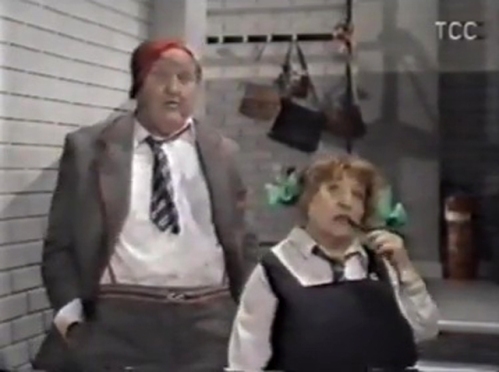
Whizzkids Guide is profoundly irritating, as you’re essentially stuck listening to a bunch of know-it-all children for two hours, but despite describing the filming in his diaries as “a day of appalling tedium,” Kenneth breezes everything along on his charm, and it’s always lovely to see him. Even when he’s doing something he hated (which was pretty much everything), he’s still giving us the Kenny classics; the flared nostrils, the laugh, the snide voice, rolling his Rs, skinny little knobbly knees on show. There’s a bit where he challenges the others to draw a dot in a circle without taking their pen from the paper, and you know as soon as they yelled cut, he was saying “cor, looks like a pair of tits dunnit?!” One of the most intense Proustian rushes of my life gut-punched me with his description of beans on toast as “skinheads on a raft,” and few sights are as joyful as Kenneth Williams leading a sing-song of “if you stay to school dinners, best throw them aside, a lot of kids didn’t, a lot of kids died!” He even gets Mullard with the old “what is frozen ink?” last seen in Copy Cats.
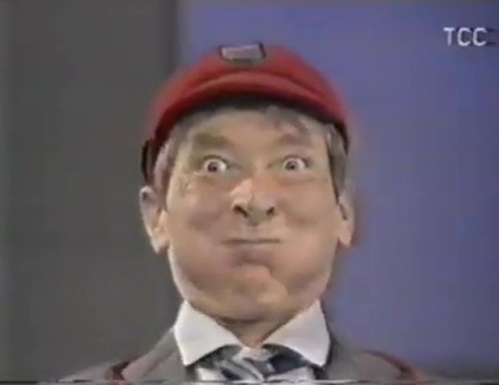
The show’s at its best the scant moments it feels like a live action Bash Street Kids; a world of pea shooters and dinner ladies whose dumplings crash through the floor. Late in the run, James Bond music leads us down to an underground factory where the kids build their practical jokes, mixing stink bombs in test tubes, and more worryingly, showing Kenny and Arfur tipping chemicals into a round bomb marked ‘explosives’ like there’s going to be a school shooting. But the teacher who mistakes it for a football is left — as such scenes always should — soot-faced and smoking with shredded clothes. I wish they’d done more of these cartoon physics, which is mostly left to the Dingbats, like in a How To Cheat at PE, where a 100-metre sprint’s aided by fireworks strapped to a plimsoll, leaving a man-shaped hole in a brick wall. Episodes end with the four main cast stood in a row singing the school song in tuneless assembly style, as credits roll over the top.
Whizzkids are the winners
Whizzkids is our name
We trampled on our teachers
Until they cry with pain
We wore them out and poke
A finger in their eye
Whizzkids are the winners
We never have to try
Whizzkids are the leaders
Whizzkids are the tops
We never are the losers
We never ever flop
We bend the rules a little
We always win the game
Whizzkids are the winners
Winning is our game
Hooray!
If you actually could convince anyone to fall in the trap of saying “just like me” after every sentence, and successfully drop a “and then I saw a monkey…” then it’s very much a win that’s been earned. But I find a strange phenomena with older ‘big school’ media from back when I was yet to step through its doors, and don’t know if it just applies to me. Though I’m now older than half the teachers, bigger boys in these things still feel like bigger boys, and if I see some vintage Grange Hill from the era I’d yet to join big school, Gripper Stebson feels like my elder; like he could push my 40-something head into the bog and there’s nothing I could do but splutter on piss. Who knows how I’d have felt about leaving juniors had I watched Whizzkids Guide, leaving me thinking fourth-formers looked like Arthur Mullard, expecting a voice like a flushing toilet coming from the back of the classroom with a “OI KNOW HOW TO PLAY A TRICK ON TEECHA,” before gluing a penny to the floor and tearing a sheet of paper when Sir bends over. Did I make the right decision watching this privately? Oh yus.
…
This piece first appeared on my Patreon, where subscribers could read it a month before it landed here. If you’d like to support me for as little as £1 a month, then click here to help provide the world with regular deep dives about weird-bad pop culture, early access to my videos, my podcast, and all kinds of other stuff.
There’s a ton of content, including exclusives that’ll never appear here on the free blog, such as 1970’s British variety-set horror novella, Jangle, and my latest novel, Men of the Loch. Please give my existing books a look too, or if you’re so inclined, sling me a Ko-fi or some PayPal cash.
August 27, 2023
Royal Variety IV: Breaking the Format
…
This video first appeared on my Patreon, where subscribers could watch it a month before it landed here. If you’d like to support me for as little as £1 a month, then click here to help provide the world with regular deep dives about weird-bad pop culture, early access to my podcast and videos, and all kinds of other stuff.
There’s over 660,000 words of content, including exclusives that’ll never appear here on the free blog, such as 1970’s British variety-set horror novella, Jangle, and my latest novel, Men of the Loch. Please give my existing books a look too, or if you’re so inclined, sling me a Ko-fi or some PayPal cash.
VHS:WTF – Stallone’s Knockouts
…
This video first appeared on my Patreon, where subscribers could watch it a month before it landed here. If you’d like to support me for as little as £1 a month, then click here to help provide the world with regular deep dives about weird-bad pop culture, early access to my podcast and videos, and all kinds of other stuff.
There’s over 660,000 words of content, including exclusives that’ll never appear here on the free blog, such as 1970’s British variety-set horror novella, Jangle, and my latest novel, Men of the Loch. Please give my existing books a look too, or if you’re so inclined, sling me a Ko-fi or some PayPal cash.
August 8, 2023
The Brady Bunch Variety Hour

On sheer brand recognition, The Brady Bunch is one of history’s most culturally significant sitcoms; at least in its infinitely parodied opening titles, where the cast’s boxed heads look each other up and down against a clear blue background. As explained so succinctly and saccharinely in the theme, a mom (“a lovely lady”) with three blonde daughters marries a man with three brunette sons — “that’s the way we all became the Brady Bunch!” — for the hi-jinx heavy set-up of a blended family plus housekeeper. The original series ran from 1969-74, accompanied by five albums, thirteen singles, and a cartoon; Filmation’s The Brady Kids.
The end was short-lived, back just two years after cancellation, in the form of Sunday night’s Brady Bunch Variety Hour. The series was helmed by brother-team Sid and Marty Krofft; Canadian puppeteers behind the Banana Splits, turned producers on series noted for wildly psychedelic visuals, including H.R. Pufnstuf, Land of the Lost, Lidsville, and Sigmund and the Sea Monsters. Sid and Marty also ran brother/sister variety show Donny & Marie, on which four Bradys reunited for an episode which drew such giant ratings, ABC brought the whole band back together for their own series. Everyone returned except for — as lampooned in the Simpsons Spin-Off Showcase — recast middle daughter, Jan; selected from 1,500 auditionees one day before rehearsals began. By the time of airing, the youngest kids were now 16/17, and the older ones well into their 20s.

The Brady Bunch Variety Hour is notorious as one of TV’s most catastrophic failures, and at the heart of this is its conceit; that the actual sitcom family landed a hosting gig, in-character, father quitting his job as an architect at his children’s behest, to move everyone out to Hollywood. Imagine Bruce Forsyth’s Big Night was hosted by Slinger from Slinger’s Day, or if the Trotters had their own Saturday Night Takeaway; Uncle Albert donning a top hat to shuffle his way through Seventy-Six Trombones, while everyone places bets on if he’ll crack his head open like at the comedy awards. Viewers had to constantly remind themselves they weren’t watching a real family, suspending their disbelief like when the Golden Girls show up in a skit at the Royal Variety. Including the pilot, there were nine episodes, of which just two are available today, due to their unfathomable release on VHS and DVD in 2000.
1976’s pilot has a dizzying opening, with a line of high-kicking showgirls — house troupe The Krofftettes — in classic sequins and feathers, black and white headshots of the cast projected behind them, as the soundtrack degrades into the famous theme played on kazoos. Stage doors pull apart to reveal the family, all eyes and teeth, in flared jumpsuits like something Ric Flair would wear to a crystal healing session, enthusiastically swaying through lyrical non sequitur “babyface, you’ve got the cutest little babyface…” Well, ta very much! Predominant look for the series is sparkle; every millimetre of set and costumes plastered in spangles and bulbs, devouring so much of the world’s glitter supply, your wife’s had to close her home-made birthday card business. Constantly reflecting off the lens, they might as well be shining a laser pointer in your eyes, and a 4K remaster would leave audiences like PJ after the paintballs. As the medley reaches Donna Summer’s Love to Love You Baby, with the surprise of a Bond villain pushing a button, a pool opens up in the studio floor, dancers blowing kisses as they launch themselves down a slide into 50,000 gallons of chlorinated bottled water.

The pool’s a big set piece, and through the series, family members repeatedly fall or get pushed in. It’s pure Busby Berkeley, using every beat from both classic Hollywood swim-dance and its parodies; the ‘panning down the line as everyone goes in’; the ‘shot from overhead on a big swing’; the ‘synchronized mermaiding’. Its reality was less glamorous, with soaking wet Krofftettes battling freezing conditions, in a pool directly next door to the stage which housed Donnie and Marie’s ice rink. ABC’s strict mandate banned both goggles, and the frightful sight of air bubbles farting from a nostril, forcing the women to exhale before entering the water, for constant and lengthy retakes over 15 hour shoots, many of which had them sat on the bottom of the pool. Hair was held in place using a gel concoction which turned it green, though in later episodes they were allowed headwear.
Jets of water shoot up for the big climax — “babyface, babyface, babyfaaaace!” — and we’re straight into the Variety Hour‘s sole narrative device; jokey bickering. Family sitcoms thrive on toothless insults, and even fronting a prime time TV show, they simply cannot communicate any other way. “How’d you like to eat your teeth?” “How’d you like to sit on a frog?” You’re on telly; bit of professionalism, please. Perhaps 117 episodes of the preceding series used up all the good ones, because the banter here is shocking, like “aluminium foil sings better than he does!” or “how’d you like a mouthful of purple socks?!” Actually, there’s OnlyFans subscribers who’ll pay big money for that.
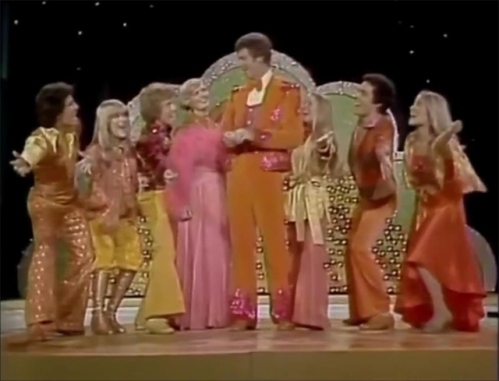
But as Vin Diesel harps on about, this is a ruddy family, and for all of its disagreements and personality clashes, there’s love at the centre. Youngest daughter Jan folds her arms with a stomp, “I wish I was dead!” Dad gets so nervous he forgets his own name. Mom gives updates like she’s sending us a Christmas letter — “she’s all grown up, but she’s still her daddy’s little girl… our son Peter is at college now, I think he’s majoring in girls.” Like WWE or the Muppets (or Motormouth), we get scripted behind the scenes, at their ‘house’. This cuts an awkward balance, attempting to recapture the sitcom vibe with stilted bits which sit too dramatically in contrast to the top-hat-and-cane hotdogging, leaving heartfelt moments playing to silence, and weak jokes salted with old fashioned audience laughter, like the fucking Flintstones.
Here, the kids want to ditch Dad because he’s got stage fright, and he overhears a plot to recast him with special guest Tony Randell (the television Odd Couple and the voice of the brainy gremlin in Gremlins 2). Randell gets big applause for zinging one kid “up your nose with a rubber hose,” and the scene ends with a group hug as everyone tells Dad they love him. “That’s my bunch!” says Mom, which coincidentally is what I titled a recent jpg to my haemorrhoid doctor.
Hard cut to a bowler hat being lifted into frame by a gloved hand, as the family strut through One from Chorus Line (“one smile and suddenly nobody else will do”), also parodied by the Simpsons when that gas turns them inside out. With each passing year, the Bradys underwent further cultural drift from wholesome to embarrassingly bland, giving a cult-like feel to their full and gleeful embrace of the growing untrendiness. In the outside world, punk was breaking, but they’re ending songs with high kicks to a slowed-down chorus like 40’s Broadway. It only serves to make constant references to modern things more dissonant; Marsha storming in with a bent record and a “look what daddy just did to my new Led Zeppelin album,” and repeated attempts to wring humour from contemporary slang, such as “cute,” “hip,” and “out of it,” in the modern(ish) equivalent of Ian Hislop making a joke about twerking.

With the kids wondering aloud if their parents were ever young, a wavy screen takes us to a Rollerama; male Bradys circling on skates in 50’s greaser wigs and jackets, gnashing on gum. And here’s where the meta thing trips me up. When the “chicks” skate in, both groups begin ogling each other, giving the eye, all “ain’t he dreamy?” That’s your dad! Actors playing siblings playing 50’s horny teens; a set-up which only feels gross if you buy into them being a real family — as the show spends its entire time forcing you to. The incest vibes summon Donnie and Marie Osmond on a stars and stripes motorbike, Donnie acting like the Fonz and leading everyone in a version of Splish Splash which somehow is worse than Charlie Drake’s.
Like a dancer with hypoxia taking the day’s fiftieth header into a freezing pool, the show’s escalating weirdness continually tops itself. We go to ads with a warning “hi, this is Bobby Brady, stay tuned for the rest of the Brady Bunch Variety Hour, or my sister will sit on ya,” and return to a scene which almost defies description. Trademark Sid and Marty Krofft acid-circus visuals, and something ’94 Marilyn Manson could’ve stolen for his videos, purple flames rise over the wail of a fire siren as Mom screams in panic from the window of a glittery house frontage set high above the pool. Her kids are dressed as clown firefighters next to a half-submerged firehouse. A frenetic, trippy scene plays out at Benny Hill speed, as clowns in stripy tights careen into an already-packed pool; a heaving soup of limbs and bubbles, balloons and splashing foam. Painted faces hold their breath, paddling wide-eyed and red-mouthed into the lens; one falls from a ladder which stretches into the sky; everything under raucous big top music, slide-whistles and inexplicable audience laughter.
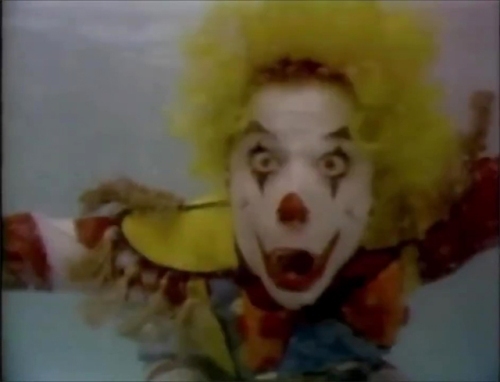
Clown sons drag their mother to safety, her oversized costume waterlogged and pulling her into the depths, as she’s shoved through an underwater door to the clown firehouse, as if auditioning for the SAS. I know “clowns are scary” is a thing bores say to sound interesting, but nobody’s leaving this without a phobia or a fetish. I feel changed after sitting through it. Directly from that to the fam sat playing a board game and chatting about the made-for-TV movie where John Travolta was a bubble-boy, machine-gunning viewers with cultural references to Pinky Tuscadero and Sonny and Cher, before an extended series of gags about East Germany.
Greg gets a solo number, Corner of the Sky from the musical Pippin (whose Broadway run he resigned from to free himself for this series), before an unbelievably unhinged performance by Tony Randell, dressed like a rustic Willy Wonka to speak-sing his way through Dame Edith Sitwell’s poem Facade — “see me dance the polka, said Mr. Wagg like a bear, with my top hat and my whiskers that — tra la la la trap the Fair.” The orchestra sound like they’re crying for help through their tubas, and the animal costumes came from a locked trunk deemed too horrible for The Shining.
In the closing ten minutes, the housekeeper shows up to reiterate that they really love each other, before Mom steps out of a family portrait for an earnest, vaseline-smeared medley of What I Did For Love and The Way We Were, over clips from the sitcom. Then everyone’s in white like Liverpool at the ’96 cup final, for a bruising end medley beside barely-dressed showgirls and motoring through half a dozen songs. Peter’s dressed like Elvis, Mum and Dad take old standards; Cheek to Cheek; I Could’ve Danced All Night; and everyone la-la-las through the Hustle, shake-shake-shaking their booties. The studio floods with dancers and pyro as the pool opens up. “Wow,” says Dad at the big finish, “we made it.” I’m not sure the same can be said for me, though I perk right up at the hilarious credit for a mister Dick Browning.

I subjected myself to one more, episode four from March 4th 1977, as it’s of special interest to me, your favourite goth, with guest star Vincent Price. Opening number sees the Bradys precariously balanced on an Escher-esque series of platforms and tiny staircases, kicking flares to Keep Your Sunny Side Up. That song always triggers a flashback, of the time Simon Brett who wrote ITV sitcom After Henry came to my junior school to judge our stories, and some kid said “anyone see Clarence last night?” in reference to Ronnie Barker’s one-and-done short-sighted 1930’s removal man sitcom, of which that was the theme. Another lad replied “keep your sunny side UP!” punctuating the final word by thrusting his cock into the air, and getting sent into the corridor. Sorry yes, the Brady Bunch.
Underwater dancers dressed as sunflowers form legs into shapes, one rising into the ceiling on a swing, as the family cheerily demand of us “keep your sunny side up, keep it up!” I don’t want to! This episode really underscores the awkward crevasse between wacky variety and sitcom plot, as Mom tells us what a rough week it’d been — “we had a little problem with Greg.” Shown in flashback, Greg’s had it with his noisy siblings and announces, despite loving them all very much, it’s time to be a man and move out. Cue slow and dramatic zoom on Mom’s upset face.
Though he’s a very old-looking 22 with a Cromwell Street haircut, Greg’s leaving is treated as an unthinkable tragedy, and I guess it’s a plot they never explored in the sitcom, getting the full ‘kid moves out but discovers it’s not like they’d hoped’ trope, when his great new apartment turns out to be a shithole. Said place was acquired by Brady neighbour Rip Taylor; best recognised by millennials and Brits as the chap who throws confetti (and his own wig) everywhere at the end of the Jackass movies. Taylor was brought onto the Variety Hour as love interest for the housekeeper.
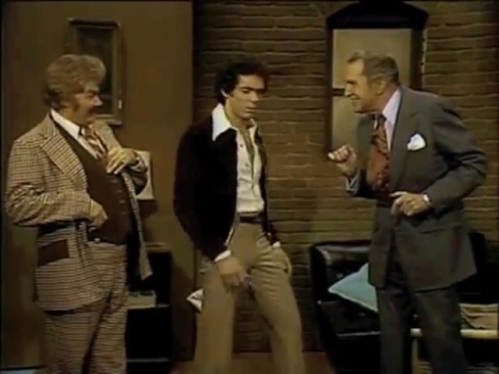
A sudden knock at the front door signals Vincent Price, giving it his very best Vincent Price (an undead Donald Sinden), with a ghoulish “I come in friendship, seeking relief from the turmoil of this temporal life.” Rip and Vincent engage in a glorious camp-off; a race to devour the scenery, meeting in the middle like Lady and the Tramp, as Vincent lets on that the apartment’s haunted. Sadly, this exciting set-up is the beginning and end of it, and there’s to be no Vincent Price Monster Mash accompanied by dancing skeletons and half-naked showgirls covered in talc.
Instead, Momma Brady’s in tears during a Greg phone call, cradling his photo to her chest like he’s died, as the lead into her song; “faded photographs, covered now with lines and creases…” This is proper Yarwood-level earnesty, cutting between her, and Greg’s own wistful gaze at a family photo, about sixty seconds after Vincent Price was being all spooky. Surrounded by TOTP style purple haze, Greg appears behind her with his own maudlin refrain, “all by myself… don’t wanna live all by myself any more…” Links between crazy song ‘n’ dance numbers are given with heavy hearts, Brady parents cuddled together, sadly mourning the loss of their adult son. Later that night, Greg shows up for the emotional reunion, hugging his mom, apologising and sheepishly asking if he can have his old room back. The entire family runs in to embrace him after a long 36 hours apart, all played soberly with no laughs, other than at their shitty gags; “I guess this means I don’t get your room!”
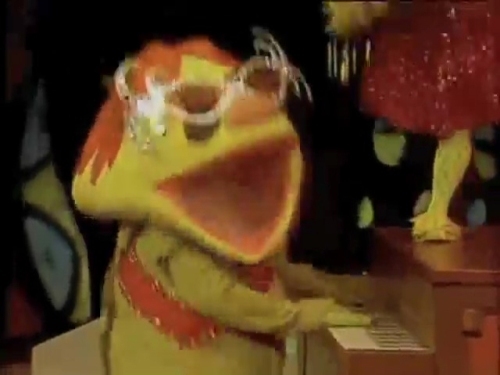
Straight from that to Peter falling in the pool, and musical guest, Elton John. Sorry, my mistake, not Elton John, but H. R. Pufenstuf, deranged former World’s Fair mascot, dragon with a head like the bulbous yellow helmet of an excited penis, and star of titular Sid n Marty Krofft series; the trippiest show ever made. Left without a musical guest after an 11th hour cancellation, Pufenstuf was drafted in, gigantic Elton glasses pinned on his glans-head, to mime along to an Elton-penned track, Celebration; produced for the puppet show at failed theme park, The World of Sid and Marty Krofft, which closed 6 months earlier. H. R. enthusiastically bobs at the piano, loose foam maw yapping up and down like a jogger’s ballbag. During a poolside dance routine, the mouth becomes ‘stuck’, with the poor sod inside manually having to yank it back open. Accompanied by a dancer dressed as a giant chicken, there’s a sense this is what Dooby Duck could’ve been, had he been backed by American money and military grade hallucinogens.
After Marsha’s heartfelt and sullen Time in a Bottle, they throw a party for Greg, as Rip hangs balloons by a huge WELCOME HOME GREG, WE LOVE YOU banner and calls us “ding-dongs.” Marsha begs the housekeeper for a lick of the cake bowl, pleading “I’ve been really good this week, I’ve lost 5lb,” and Greg’s presented with a key to his room “for privacy,” meaning he can finally enjoy his very first wank. Then the housekeeper steps on Bobby’s skateboard, accidentally mashing a cake into his face. “Well, that takes the cake!” shrieks Rip Taylor. It’s into glitzy suits and dresses for the closing medley, fifty balloons strapped to each dancer’s back, and songs about happiness — Happy Together, Make Someone Happy, Put on a Happy Face; even the Happy Days theme. Rip and the housekeeper bust some moves as a giant smiley descends from the ceiling, but sadly, the exhaust fumes from Vincent Price’s taxi have long-since dissipated.
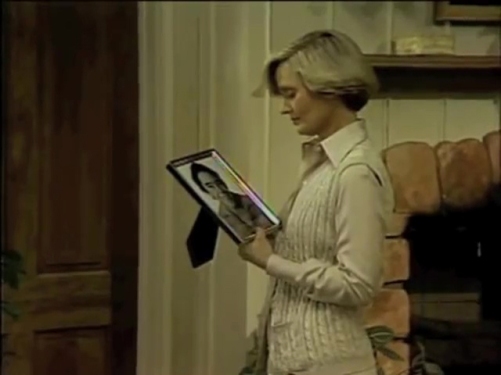
Cut to credits, they’re still harping on about being happy to have Greg back, arm in arm and closing with United We Stand — “united we stand, united we fall.” And fall, they would, as Variety Hour‘s legacy was a guaranteed and well-deserved spot on every Worst Of list until the end of time. The Bradys would be resurrected in a bunch of reunion TV-movies, specials, and sitcom continuations, none of which made reference to the time they hosted a television show. The most distressing thing about the whole endeavour is the enormous amount of time, effort and money put in, with multitude eight-person song and dance sequences, all needing to be choreographed and rehearsed, and everyone changing outfits about twenty times per show. Perhaps its most succinct epitaph is the Wikipedia footnote on its final episode: “According to various cast and crew members, former alcoholic Paul Williams got very drunk before they filmed the closing number.”
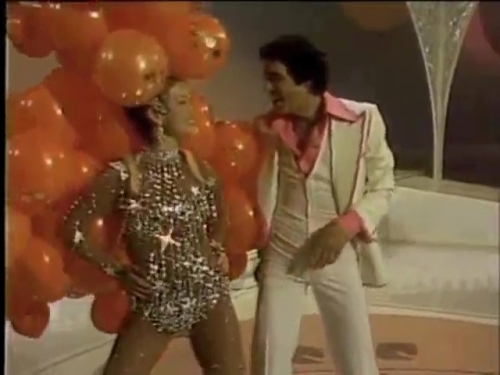
Over thirty years later, The Brady Bunch Variety Hour would be done for real, with the Osbournes, hot off setting the format for all celebrity reality shows with their MTV series. Osbournes Reloaded aired for a single episode in March of 2009, featuring parodies of Flashdance and Juno — starring a dragged-up Ozzy — various pranks, like forcing a young man to get off with an old lady, and an actual genuine ‘Knowing Me, Alan Partridge, knowing you, another Alan Partridge’ segment, meeting other families named Osbourne. The premiere was cut from an hour to 35 minutes shortly before broadcast, with the series immediately cancelled, leaving five episodes unaired. Needless to say, I’d sit through the whole wretched Brady Bunch version just for a snifter of it, and that’s to say nothing of Hear’Say It’s Saturday.
…
This piece first appeared on my Patreon, where subscribers could read it a month before it landed here. If you’d like to support me for as little as £1 a month, then click here to help provide the world with regular deep dives about weird-bad pop culture, early access to my videos, my podcast, and all kinds of other stuff.
There’s a ton of content, including exclusives that’ll never appear here on the free blog, such as 1970’s British variety-set horror novella, Jangle, and my latest novel, Men of the Loch. Please give my existing books a look too, or if you’re so inclined, sling me a Ko-fi or some PayPal cash.
July 30, 2023
Copy Cats: Making a Bad Impression
…
This video first appeared on my Patreon, where subscribers could watch it a month before it landed here. If you’d like to support me for as little as £1 a month, then click here to help provide the world with regular deep dives about weird-bad pop culture, early access to my podcast and videos, and all kinds of other stuff.
There’s over 660,000 words of content, including exclusives that’ll never appear here on the free blog, such as 1970’s British variety-set horror novella, Jangle, and my latest novel, Men of the Loch. Please give my existing books a look too, or if you’re so inclined, sling me a Ko-fi or some PayPal cash.
July 18, 2023
Owt Good On, Mam? – Dave Courtney

[previous OGOM: The Three L’s — Bear Special — When Game Shows Had The Horn — Celebrity Helpers — Su Pollard — Forgotten Sketch Shows — Sky One Originals — Pub Athletics]
Regular readers know the people I’m most drawn to are those who decided they’d become a character, from which they never broke. Hulk Hogan. John McCririck. Dave Courtney. Late 90’s culture was fascinated with gangland figures, due in part to the 60’s revival, yearning for a return to swinging London, to hang out with Michael Caine, Twiggy and the Krays. Into this fad, along with Howard Marks speaking tours and ‘Mad’ Frankie Fraser popping up as the baddie in a Reservoir Dogs rip-off swaggered Dave Courtney; a knuckle duster waving self-publicist more than happy to tell all about a wild life of crime (which he definitely didn’t do any more!). Despite having somewhat of a fantasist rep among other noted bad lads, Courtney quickly built an empire of going on and on about being hard, churning out books like David Walliams, being profiled in various documentaries (including one where he got the hump with a children’s magician), being the subject of a Rancid song where they portrayed him as a literal gangland Robin Hood, and even going into porn. Consequently, since I started doing these, the grim inevitability of tackling Courtney’s oeuvre hung over me like a 300% interest debt to a violent loan shark.
We’re starting back with 1991’s Bermondsy Boy, before Courtney was a name and merely a debt collector being profiled in a BBC2 strand called From Wimps to Warriors; a six-part series “examining the lives of men, particularly on sex and relationships, and some of the myths of masculinity.” Other episodes include men who dominate women in S&M relationships, and men who are angry because their wives go to work, and though you might be imagining the shock-doc genre Channel 4 churn out about Blokes Who Have Sex With Bins, this is artful early 90’s BBC; mediations on what it is to be a man, all at a Dutch angle with the sort of droning atonal soundscape I usually dub over creepy old puppets. That said, the YouTuber that uploaded the VHS rip stuck their own tag on the front, shot portrait mode on a phone, of knuckle dusters being loudly dropped on a kitchen counter.
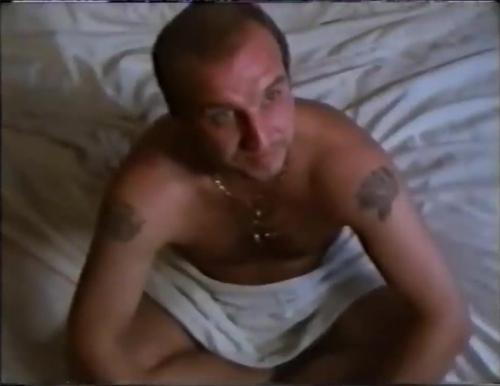
Dave’s still got hair here, angrily punching at a bag, slow pan up gold jewellery tangled in his sweaty, hairy chest, as he talks of having no remorse, guilt, or compassion when duffing up other lads. The camera’s fascinated with the figure of Dave Courtney, giving fearful, loving gaze, and there’s a real sense of a trustafarian film school toff feeling he’s ‘discovered’ an incredible slice of reality in such a brutalist creature. “This chap releases gas from from the hole below his testicles. I promise, you have never seen anything like it!” Filmed from above while sat on the bed in just a towel, resembling the Buddha, Dave shows off scars from being bottled and stabbed. Then he’s playing with his kids, pelting round a rubbish-strewn back yard, child on his back, sword-fighting with two half-burned planks of wood from a bonfire.
I had seen this documentary before, and three scenes really stuck with me. The first follows Dave on the job, evicting a group of squatters. His debt collecting outfit is an unfortunate combo of early 90’s tough guy fashion worn by a man really leaning into it. Knuckle dusters over black leather gloves with red trim, gold chains on the wrist, aviator sunglasses with another thin chain hanging hanging off the arms like Hinge and Bracket, with extremely tight blue jeans, and topped off by the sort of enormously-shouldered leather jacket Wham-era George Michael would’ve considered too flamboyant. There’s no way around it; Dave and his similarly-attired mates booting in the door just look like a live action Tom of Finland adaptation (don’t Google that if you’re at work). In a moment which is certainly not faked for dramatic effect, he offers startled residents one chance not to get ‘urt, barking “SHUTTUP, DARLIN’!” at scared-looking student types, and threatening if he comes back next week to find anyone still here, he’ll “break you in ‘alf!”
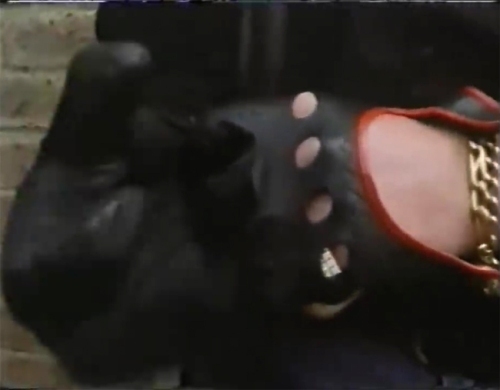
The sudden cut from this to the next scene is the most sudden cut in anything ever, from chucking squatters’ clothes out of a window, to — with absolutely no warning — an overhead shot of Dave Courtney laying in the bath, flat on his back, barely enough water to cover his dick and bollocks, let alone any bubbles. It’s perhaps the most hilariously needless nudity ever broadcast. Was this the director’s idea? Dave’s? It’s meant to give an air of vulnerability; the hard man completely exposed; but if you mute the thug-philosophy witterings, it’s simply a very small penis, displayed on your screen for ages. Dave’s voice-over talks of working the doors and “throwing out geezers for selling coke,” plus the attempted murder charge he’s currently facing, which centres the documentary. However, the viewer’s eye refuses to be drawn from a strawberry-like penis and ballbag.
The third scene I remembered is still as fresh in my mind as the first time I saw it, with a grimness which cannot be cleansed. A picnic is portrayed with the frenetic, escalating editing of Uncut Gems, a battering soundtrack of drums and dog whines, as Dave and his mates laze about on blankets on a wasteland. Dave’s in a big hat, chains round his neck like Mr. T as he licks a Rizla. There are black pit bulls everywhere, being teased and taunted; drool swinging and heads snapping side to side in rough tugs of war. The camera constantly cuts back from men talking on big mobiles or doing wheelies on a dirt bike, to footage of two pit bulls having sex while Dave’s mates cheer it on. One bloke pushes down on the male dog’s arse as it pumps away, to help it really give her one, even using his boot for maximum purchase.
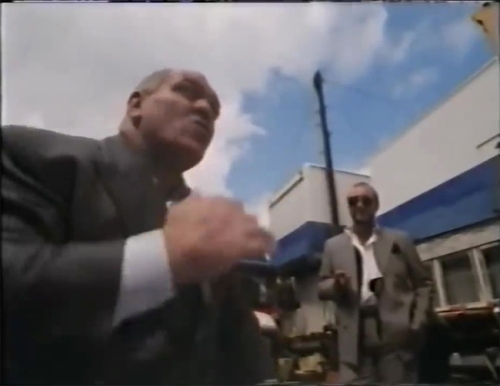
This lovely afternoon ends on Dave hand-in-hand with his little boy — around seven years old — filmed from some distance under jangly horror-esque music, as dad reminisces with son about various beatings he’s doled out, laughing about the time “daddy had a fight with a big black man” and kicked him down a hill; about beating the shit out of a man in a sunbed. Is this why Dave claims himself inspiration for Vinnie Jones’ character in Lock, Stock? Any new fathers wondering how one might motivate their sons, simply sit beneath Courtney’s learning tree, telling his boy he can be anything he wants — “biggest boy in the school, toughest boy, if you really, really want to, you can bash him right up!” He knows Jr’s hard, because yesterday he lost all his teeth and didn’t even cry. “You went flying across me jeep, smashed your face in the dashboard. That’s tough, mate!”
As his court date looms, we keep returning to the bath; the movie cliché of a man staring into the mirror questioning his choices. Close-ups slowly search across Dave’s chest hair, boxing glove pendant entangled like an abandoned bird nest, and eventually finding a nipple, which sits there like a pork scratching, as he opines on not fancying prison, because your cell-mate will see you “goin’a toilet.” He repossesses a van; stands smoking a cigar as Lennie McClean talks about taking fellas’ heads right off; informs us “a bonk” is more exciting than making love. I’m sorry, but you can’t purport to be a hardman and unironically describe sex as ‘bonking’ like a tabloid headline about a randy vicar. “I’m gonna cut yer fuckin’ legs off with a machete, you mug, then dissolve ’em in acid and make you watch while I give your wife a ruddy good bonking with my tadger!” Through all this, the direction does its best to remain highbrow; Dave’s monologue about throbbing morning erections told in tight close-up of his gob.
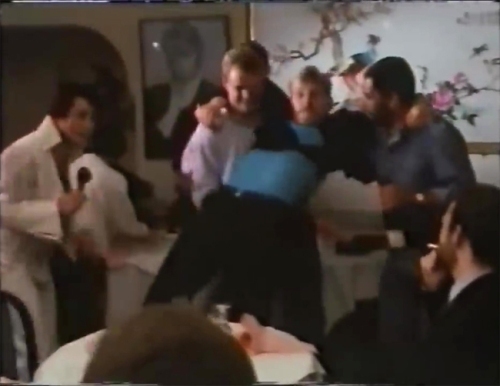
After a farewell dinner, head of a rowdy table in a Chinese restaurant, braying about the Chinese — “never trust those bastards, kept smiling all the way through Pearl Harbour, didn’t like that” — in front of scared-looking waiters, Dave lands a not guilty. A voice behind the camera asks if he did it. “What,” replies Dave, “give him a clump? No comment.” Quickly followed by “yeah, I did.” The film ends with Dave and his mate knocking on another door with baseball bats. But thank goodness for our broken justice system, as with Dave inside, we would’ve never gotten a slew of cinematic treasures made specifically for the lads you went to school with whose favourite movie is Rise of the Footsoldier 3: The Pat Tate Story.
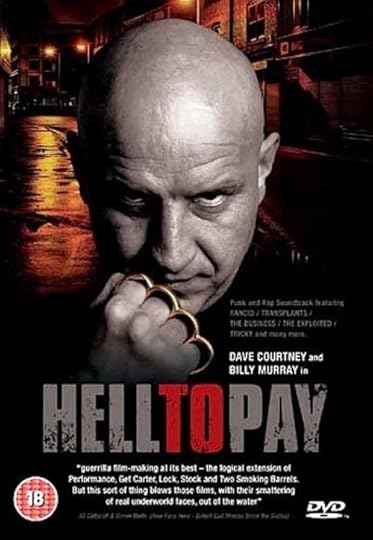
Though I’m sure they’re not — they’re definitely not! — everything on Dave’s IMDB page feels as much like money laundering as an excuse for everyone to play-act as World’s Hardest Gangster, waving guns around with topless women on their laps. His acting career began with cameos and bit parts, including a role as Jerry Sadowitz’s bodyguard on his short-lived Channel 5 show, before appearing in some blueys, as himself in Lock, Cock, and Two Smoking Bimbos, and as the Devil in Cathula II: Vampires of Sex. In 2003, he’s ‘Mad Dave’ in Triads, Yardies & Onion Bhajees! (exclamation mark part of the title), but two years later comes what he likely considers his opus, Hell To Pay. Credited as co-writer, again he stars as a gangsta called Dave — Dave Malone — and thus begins a run of phenomenal casts, packed with MMA fighters, hooligans, glamour models, ex-soap stars, and random The Sun-type celebrities, all playing either coppers or criminals.
John Altman (Nasty Nick off EastEnders) — Policeman
Nasty Nick (Nasty Nick off Big Brother) — Policeman
Jo Guest — Policewoman
Billy Murray — Larry Malone
Cass Pennant (famous football hooligan) — Malone’s Gangster
Spider off Coronation Street — Martin
Garry Bushell — One of Larry’s Goons
2008 brings Clubbing To Death, where Dave stars as non-Dave Harry Dench, along with another cracking list of co-stars, including Craig Charles, Sanjay off EastEnders, Jakki Degg, Lucinda off Harry and Cosh, and Fun Lovin’ Criminal Huey Morgan as ‘The Don’. Dave then pops up in the notorious Killer Bitch, alongside Alex Reid, some football hooligans, and Most Haunted‘s demonologist, Fred Batt. In Looters, Tooters and Sawn-Off Shooters — really favouring the Lock, Stock title cadence — Dave (as Mickey Savage) plays against Les Battersby off Corrie, while Gangsters Gamblers Geezers sees him brandishing a shotgun on the cover, as part of an ensemble including Richard Blackwood, Jodie Marsh, Ben Dover, Big Narstie, Heavy D, Liz from Atomic Kitten, Nigel from EastEnders‘ dead wife, the lad who played Nasty Nick’s son, and celebrity hairdresser Lee Stafford.
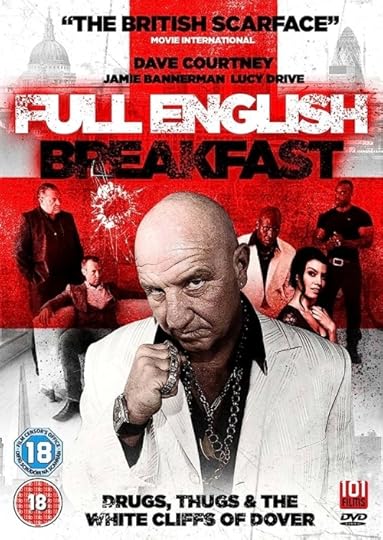
Undoubted peak is 2017’s Gatwick Gangsters, where Dave plays ‘crime boss Ray Razor’, against arch villains Diamond Larry (Bobby George) and The Beast (Willie Thorne), all co-directed and co-written by a man named Shampagne; though sadly credited under his real name of Sid Clack. It’s clearly my unavoidable destiny to someday take a header into the entire cinematic past of Dave Courtney, particularly 2019’s Satanic-themed The Seven, featuring Dave’s ‘Mr Phillips Squeaky’ alongside Alex Reid, Sinitta, Gary Webster off Minder, and as High Priest Asael, Dean ‘the worst Superman’ Cain. But for today, let’s focus on a film where top-billed Dave Courtney is the most notable cast member — Full English Breakfast.
I almost jumped off the roof when I saw the running time of nearly two hours, and after a production logo of a gun with the word DANGERTAINMENT, we open on close-ups of greasy cafe fry-ups being scoffed by men in hi-vis, complete with egregiously dubbed-on cutting/chewing sound effects as horrible looking breakfasts shovel into gobs, and a bloke raises his eyebrows at Page 3 of The Sun. A man called Jamie in dirty camo gets booted out for having no money, and when angrily kicking empty cardboard boxes, comes across a lost wallet bearing the initials DB. Of course, this is Dave Bishop, celebrity drug lord, and as Jamie goes to DB’s gaff to return it, he’s offered a job as Dave’s new driver; fortuitously, as Dave’s just taken current driver, Habib, into another room to kill him with a golf club while classical music plays. When he swings it for the POV shot, Dave’s clearly aware of not hitting the camera and they don’t edit out his very obvious pause, while the sound effects of him battering Habib are like something from Earthworm Jim.
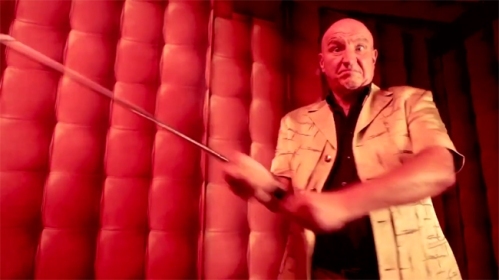
Let’s get this out of the way — because it’s absolutely clear within the opening ten seconds — Full English Breakfast is fucking appalling. The one thing which really defines a film as having been made by someone who has no idea what they’re doing is that every scene goes on way too long. Just Jamie looking at the wallet takes forever, cutting back and forth between his eyes; his hand brushing the leather; a medium shot sat on a bench gawping. That’s the whole film. Characters are constantly walking, very slowly, all the way across a room, with many scenes shot from a tripod of a person ambling the entire length of a lawn, or fully around a car before getting into it. After Dave takes him in, there’s a lengthy montage of Jamie walking to the woods to collect his sleeping bag and tramp supplies, meticulously tying everything up in a rucksack, and then walking back the way he came, in case viewers lay awake wondering what happened to his tin cans and drink bottle.
In the most basic of stories, Jamie moves into Dave’s house as his new driver — licence plate W34LTH — running errands, quickly rising to right hand man in the drug empire, and beginning an affair with Dave’s much younger wife, after she hears him screaming during PTSD nightmares about accidentally shooting a child in the army. Yes, Jamie’s fresh from a tour of Afghanistan, a place the film is obsessed with, with the words “you were/I was in Afghanistan” said multiple times by various characters. Drug rivals — licence plate AF6HAN — are constantly told they’re members of the Taliban (later revealed to genuinely be ex-Al-Qaeda).

There’s most of the usual gangster shite you’d expect; obvious day-for-night as they enter a club and Dave greets a black associate with “wagwan?”; a shed filled with boxes of ‘ecstasy tablets’ which are clearly just mints. The most fun to be had in Full English is spotting the camera that’s got a speck of dirt on the lens. There’s five minutes of story over two hours, all with the vibe of cut scenes from The Getaway — a game I once played at my elderly grandad’s while he watched me having to re-do a level dozens of times, which always began with the unskippable dialogue “Gotta go and see this Hector nonce. Hector? Sounds like a CUNT’S name!”
In London, Jamie spots Dave’s tell-all autobiography, where someone’s made the choice to shelve it next to The Dark Charisma of Adolf Hitler. The in-story book is a plot device, with mysterious flashbacks showing Jamie reading it in Afghanistan, revealing he knew all about Dave before finding the wallet. But soon Jamie’s followed in London (during the carnival, as suggested by dubbed-on party blowers) and injected with a syringe of blue liquid, waking up to find himself being waterboarded by Habib’s brother. Though they fought on different sides IN AFGHANISTAN, the brother spots an ‘STF’ on Jamie’s dog tag; short for Special Task Force, and decides to team up with him. Note that Jamie’s one of those schlubby no-budget leads who, despite (so we’re told) being an absolute killing machine, he’d lose an arm wrestle to me quick-sharp. He also sounds like he needs to clear his throat.
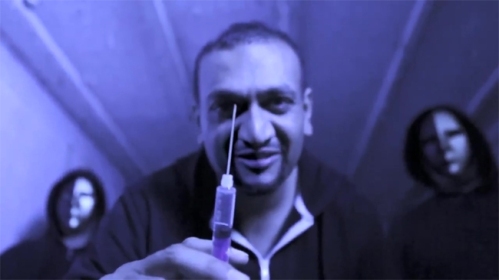
It’s here I should point out the film’s defining characteristic; the choice (or perhaps technical inability) to use zero natural sound, and dub everything on in post. It’s this which transforms Full English from completely unwatchable to a right laugh, as every scene’s riddled with heavy-handed sound effects; footsteps crunching and tapping like a 50’s radio play; every door creaking like Dracula’s tomb. Though the film’s set in Kent, night-set moments have a deafening chorus of crickets, while daytime’s filled with one looping stock “caw-caw!” of a nearby crow. All dialogue’s far too loud, magically elevating already-awful performances into something worse, with the quality of a CD-ROM FMV game, and Dave sounds like he recorded his lines while horizontal, probably in the bath. The soundtrack consists of two main tracks which show up in multiple scenes; one a jaunty Britpop instrumental, the other a rap which goes “mic check, one two, one two, UH, I represent, this is what I do.” Each of the many times these crop up, they’re replayed from the very beginning. When Jamie runs off to Paris with Mrs Dave for the final act, there’s an instrumental cover of Je T’aime with a few notes moved around to avoid copyright, and as they cut back and forth between her scenes and the action at Dave’s house, the song is restarted nine times.
It should be said that, despite being the entire reason for his casting, Dave Courtney is not an intimidating presence, staggering round like an exhausted bollock. In the climactic fight vs. Habib’s brother, it’s like watching a Space Hopper roll about your neighbour’s garden in a breeze, as he stamps on a head with all the zest of elderly Di Niro with his eyebags CGed out in The Irishman. A late-game twist has Dave catch a purple syringe in the foot and wake up chained in a shipping container to get his throat slit, where we learn Jamie is the bastard son he abandoned as a baby; a story illustrated by real photos of young Dave, Wimps to Warriors era, stood with Lennie McClean and posing with brass knucks. At least he didn’t have his acorn out. It’s suggested Jamie planned the whole thing from the beginning, despite quite obviously happening on the wallet by chance.
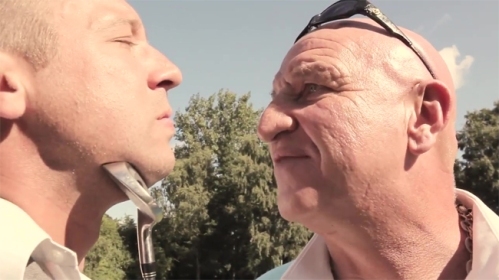
End credits are a real tonal shift, with a jaunty song to the tune of Oh I Do Like to Be Beside the Seaside going “ohhh I do like a full English breakfast!” which starts with Dave growling “well, I didn’t come in here for a curry, did I?” Clearly they were hoping for a credit-song hit, but it’s no Dragnet rap, as a man lists the ingredients of a fry-up while Dave, now as himself, aggressively informs listeners “my name’s Dave Courtney and I’m gonna tell you what made England great — the full English breakfast!” These days, woke lefties will have you arrested if they see fat going into a frying pan! Less of a surprise was spotting a free stock sound effects website listed on the credits. Well, now I’ve partially fulfilled my Dave-based destiny, although once this piece goes live and Courtney’s fans let him know about it, I’ll likely be found in the canal, all bloated, with two broken arms and a bookie’s pen where my nob used to be. But at least that way I’ll never have to watch Gatwick Gangsters.
…
This piece first appeared on my Patreon, where subscribers could read it a month before it landed here. If you’d like to support me for as little as £1 a month, then click here to help provide the world with regular deep dives about weird-bad pop culture, early access to my videos, my podcast, and all kinds of other stuff.
There’s a ton of content, including exclusives that’ll never appear here on the free blog, such as 1970’s British variety-set horror novella, Jangle, and my latest novel, Men of the Loch. Please give my existing books a look too, or if you’re so inclined, sling me a Ko-fi or some PayPal cash.
July 10, 2023
It’s a Royal Knockout: A Right Royal Disaster
…
This video first appeared on my Patreon, where subscribers could watch it a month before it landed here. If you’d like to support me for as little as £1 a month, then click here to help provide the world with regular deep dives about weird-bad pop culture, early access to my podcast and videos, and all kinds of other stuff.
There’s over 660,000 words of content, including exclusives that’ll never appear here on the free blog, such as 1970’s British variety-set horror novella, Jangle, and my latest novel, Men of the Loch. Please give my existing books a look too, or if you’re so inclined, sling me a Ko-fi or some PayPal cash.
June 14, 2023
Ultra Quiz: The Original Squid Game
…
This video first appeared on my Patreon, where subscribers could watch it a month before it landed here. If you’d like to support me for as little as £1 a month, then click here to help provide the world with regular deep dives about weird-bad pop culture, early access to my podcast and videos, and all kinds of other stuff.
There’s over 660,000 words of content, including exclusives that’ll never appear here on the free blog, such as 1970’s British variety-set horror novella, Jangle, and my latest novel, Men of the Loch. Please give my existing books a look too, or if you’re so inclined, sling me a Ko-fi or some PayPal cash.
June 11, 2023
Owt Good On, Mam? – Pub Athletics
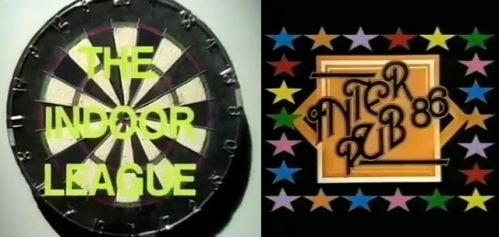
[previous OGOM: The Three L’s — Bear Special — When Game Shows Had The Horn — Celebrity Helpers — Su Pollard — Forgotten Sketch Shows — Sky One Originals]
I’m gonna level with you. I know it goes against everything it means to be British, but I am not a pub man. Never have been. Though it’s social suicide to admit such a thing, I’m very much of the school which believes “Pay for a drink? There’s perfectly good taps in the kitchen sink!” and pubs, with their socialising and urinals, are just not my tempo. As such, catching only glimpses of their sounds and stinks when striding past an open door whilst going about my important business, to me these are exotic worlds. None moreso than the pubs of 1970’s Britain, clouded beneath musket gas of ciggy smoke, and where the simple purchase of some nuts, if one is lucky, may reveal the fading image of a bare breast. But among the chatting, boozing, sorrow-drowning and flirting, something else was going on in these establishments — sport.
For folks like me who’d rather stay home, Yorkshire Television’s Indoor League helpfully brought these sports into viewers’ living rooms. Not the usual guff you’d see on Grandstand — though presented with exactly the weight and importance of football — these were proper sports, contested by working men and women after a hard day’s graft. Darts, arm wrestling, skittles; if Slap Fighting can be a televised sport, why not shove ha’penny? From one perspective, this is the analogue e-Sports. Created by dart commentating legend Sid Waddell, Indoor League ran from 1973-77, airing at 5:15pm on a Thursday, perfect for sitting down with your tea on your lap after the hoot of the factory whistle. I’m watching a pair of episodes, first coming from The Irish Centre in Leeds, and hosted, as always, by Yorkshireman and cricketer, Fred Trueman.
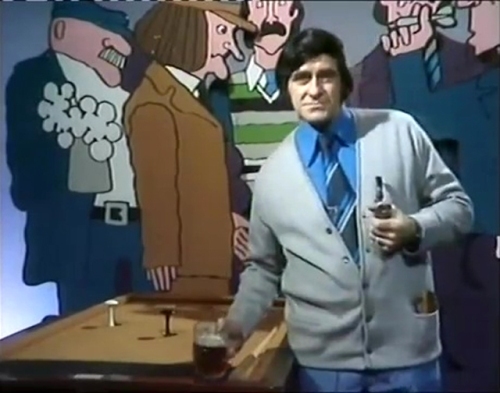
In a powder blue shirt and tie beneath a half-buttoned grey cardigan, far-too-black hair swept in a wig-like crest from left to right, Fred as much resembles a cartoon as the flat-capped pub goers rendered on a mural behind him. Pint in one hand, pipe in the other, he walks into frame to rest it on a billiard table. Hubbub and bustle murmur in the background as he informs us that last year they scouring the pubs of Great Britain — “skimmed the top of the milk from the nation’s tap rooms” — while this year, they’ve recruited talents from further afield; the United States, Scandinavia, and the Isle of Man. We’re promised “more stars than a Midsummer Night” with “portraits of skill and technique.” And what stars!
Before the main proceedings, there’s a breathless (because of the smoke) tour of Indoor League‘s various pursuits, beginning with a cry of “one hundred and eighty!” as three darts pierce a treble twenty. Both genders are at play, as a female darter shakes her head in self-disgust after a bad throw. “Temperamental, but talented,” says Fred. A black arm wrestler (former World of Sport star ‘Iron Fist’ Clive Myers) grapples with an opponent, while Fred describes him slightly problematically as a “boy with his eyes bulging like his biceps!” Men with enormous collars and even bigger sideboards pump the handles of a foosball table, and there’s character on every inch of the screen. A woman with a blonde beehive, necklace of pearls the size of ping pong balls, bends over the green to slam a ball into its pocket. “And glamour comes to the American pool table, in the shape of Vera Selby.” This is a vivid, busy portrait of an Olympic mix of disciplines, or as Fred puts it “if Van Gogh had been round with that lot, there’d be no need for him to lop off his lughole through lack of inspiration.”
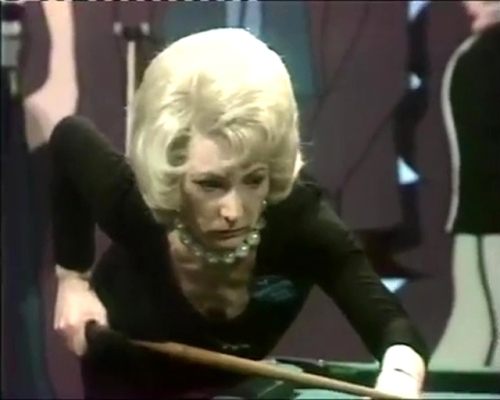
This week is all about ladies darts; “the birds of a feather… markswomen who wouldn’t have let down Henry the V at Agincourt.” Outside of track and field, this must’ve been one of the first places one could regularly see women’s sports. Given it’s just people chucking little spikes, over and over, even for knock-kneed sport haters like myself, darts is oddly watchable in any form, but here in a 70’s pub, there are no men with painted mohawks, nor cutaways to an audience in padded Batman fancy dress. In their place, horn rimmed spectacles, cardigans, and hair so high and wide, there are husbands who’ve not felt sun on their skin for years. Each lady has a look so distinctive, they could be used to compile a working Guess Who? board, and with none of the stupid gimmicks familiar from the men’s game, like that paedo Dracula with the candelabra. These are women called Mary Smith and Jessie Cattrick from Middlesbrough; each likely the first time that British housewives saw themselves represented at a sporting event. Arrows fly in highlight reels, finding rest in doubles and trebles, and we cut to Fred, arms folded, clutching his pipe. “They’re just some of the lasses that can serve up tonnes just as easy as they serve up Sunday dinner.”
In a full leg, Kay “The Shipley Bomber” hoys at the board like she’s stoning a man to death, lit cigarette in the other hand, shaking her head as she gets a 26; a 31; a 13. Her opponent, Nana Mouskouri lookalike Brenda, hammers out the 100s. The cartoons from the mural stand round the set in giant cardboard cut-outs, art deco style at odds with the setting, like finding a 1930’s French fashion magazine mopping up piss in a Wetherspoons. The low-scoring Shipley Bomber takes so many throws, the score man has to hurriedly wipe clean the now-full blackboard. Her opponent too goes to pieces, once miles ahead, but missing the winning double again and again. Both women repeatedly put their darts wide, evolving into an agonising yet beautiful spectacle, commentator remarking “one feels that the dry sherries are taking their toll.” Men’s darts players are of course tee total. When Brenda finally lands a double-one, the place erupts.
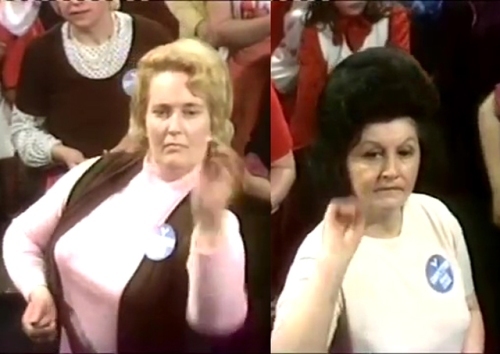
We go to a break with Fred promising “I’ll see thee” and quaffing from his pint, greeting our return with an “ey up!” Next is Jean (“a little blonde from Stockport”) vs. Millie, who’s got a throwing stance akin to taking a curious glance over a neighbour’s fence, twisting each dart 720 degrees in her fingers. Jean’s is more of a nervous ‘your mum going ‘ooh, I don’t know what i’m doing!‘ while playing Wii Sports on Christmas Day’. She took it up when she was courting; “makes a change from park benches I suppose,” and as Millie scores an eleven, she’s deemed “silly Millie!” Other match-ups are “an absolute ding-dong” between Mrs. Westwood and Mrs. King, which sounds like an ITV detective series about two busybody potters, and Mary Smith taking on Sweden’s champion, Greta, who once again is labelled “a temperamental little lady from the land of the lakes.”
Darts clearly spoiled us, as the next episode focusses on bar billiards, with footage of last year’s winner wiping his mouth with a sleeve as he pots the final ball, returning tonight to defend his crown. Even surrounded by an audience which includes an old lady rubbing her fingers round the inside of a wet, empty glass, bar billiards makes for visually unimpressive television. This is pure village fete, manned by a vicar offering three shots for 10p; it’s snooker for babies, with one of those wooden sewing mushrooms my gran used to have protruding from the middle of the table. As happened in the ladies darts, both competitors go to pieces at the end. “Bound to be nerves when there’s some money about” says the commentator, of its £150 prize. After ten minutes of frenetic yet deeply uninteresting footage of men in shirts bending over a table, last year’s champ is defeated. The winner’s called onstage to be awarded a TV Times gold medal, balanced on a red cushion along with the cheque, by a pair of smashing ladies. A little fairytale trumpet parps as Fred wraps the medal round his neck, and it’s exactly like the end of Star Wars, if it were filmed in a giant ashtray.
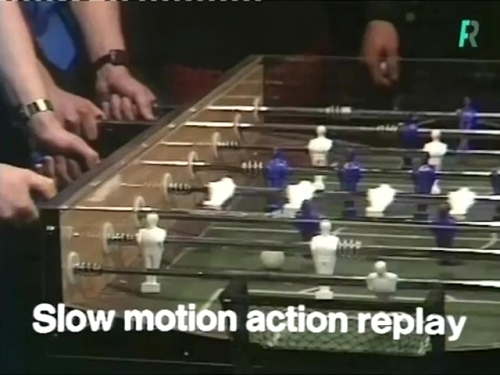
Then it’s the semis of table football. Fred scalds us with “if you think there’s not much skill in this game, watch out for the lads coming up,” but I’m sorry to inform him that’s exactly what I think, even if he reckons there’s as much athletic prowess as you’d get in a first division game of real football. These tables were in every youth club, tuck shop, and older brother’s bedroom of my childhood, most with a taped-on sign warning NO SPINNING! But come off it, it’s just random; ball bouncing around wildly and nobody with any control. Teams are the astoundingly named John Kropacz (pronounced Crowpatch) and Frank Bowkett (sadly not pronounced bouquet) vs Sandamas and Merchant. Commentary says Kropacz has a trademark up his sleeve; “the ricochet off the outside man to the centre forward,” but I’m definitely right, it’s just blokes yanking on rods and hoping for the best. They give it proper coverage, with slo-mo replays, but out of all the games, this most comes across like a joke; the Stare Out contest in Big Train. A goal rattles in, and rowdy fans are told to quiet down by players needing to concentrate on moving poles in and out and wiping sweaty hands on jeans, as commentary pretends the little plastic players are capable of “selling the dummy” and making passes.
From Indoor League, we move to the final of TSW’s Inter Pub ’86. Terrific opening credits have Chas ‘n’ Dave style honky tonk piano over shots of darts hitting bulls, pints being pulled, men’s big hands forming into the arm wrestling position, and the title of the show on a beer mat. By the end of it, my ceiling’s magically gone yellow. Highly regional, the competition went out in 1986, ’87 and ’90, and this year’s final goes down on neutral ground of Torquay, pitting Portland’s Clifton Hotel against The Carpenters Arms in Sherborne, in a series of challenges to determine which pub is the best at games. On the line is an engraved tankard for the winning landlord, with additional prize money of £750, plus £250 to the runners up.
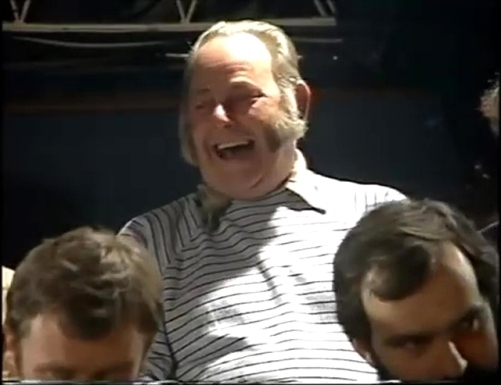
The first category is a rather surprising talent show, judged by a moustachioed man in a jumper with dozens of little teddy bears knitted into the design. Named Ed Welch, he turns out to be a television composer of some note, having scored the Confessions Of film series, and composed the themes for Blockbusters, Catchphrase, Crosswits, and Knightmare, among many more, including the aforementioned fantastic opening for this show. He’s aided in judging by “two lovely girls,” Diane (lead singer of hotel band April Union), and a young Ruth Langsford. In front of a boisterous crowd, first act is comedian Terry Scannell, opening with a Benny Hill salute, and straight into an “Alwight?! Alright at the back?!” It’s all long-winded jokes with bumbling delivery and various accents, plus impressions of Stallone and Reagan, but the audience of big sideboards and perms are very amused.
Clifton’s entry are four-piece band The Scandals, four chaps with a cover of Rod Stewart’s Sailing, into You’ll Never Walk Alone which gets everyone off their chairs and swaying. They’ve a vocalist with a beautiful mullet and red braces over a sleeveless white shirt, and a keyboardist in a piano key tie, who beat out Scannell for the points. However, judges spring a bonus prize of five hours in a professional recording studio to Scannell, who’ll need to memorise a lot more other comedians’ jokes to fill all that. Next is skittles, hosted by a man with a ginger moustache who’s a very high talker. Everyone crams tightly either side of the bowling lane (a long piece of yellow lino), so rambunctious, given just the audio, you’d think two bare-chested men were engaged in a fuck-fight to the death.

Even better than that, it’s a bald man in trousers squatting down to fling a ball down the track with such violent force, he hurls onto his belly like a human torpedo; unnecessarily so, for little wooden skittles like children use in the garden. His actions incite a chant in the audience of “Willy Willy Willy! Oi Oi Oi!” and either that’s his name, or something fell out when he chucked himself on the floor. The Carpenters’ bowler, Bruce Forsyth chin and comb-over like a brown river on an ordinance survey map, has a more leisurely and classic style, blowing on his hand before dropping to one knee. With this, he takes the win, and another five points for his team, each represented by a pint of beer.
Host Peter Barraclough flinches when a man bellows right in his ear as he introduces the darts, in a beat-the-clock speed game, where a young chap resembling Dahmer faces a guy with a droopy Kenny Powers tash, who’s an even higher talker than the redhead. What’s in that beer, helium? Keeping time is a sexy maid with a comedically oversized pocket watch, bigger than her head. As Kenny takes the victory, an old lady hooks her handbag over her elbow so she can applaud. Then, the arm wrestling competitors come down in boxing robes, and in a neat crossover with Indoor League, the referee is Clive Myers. It’s a decisive victory for Clifton, in which he doesn’t even need to go Over The Top (the t-shirt for which Myers is wearing).
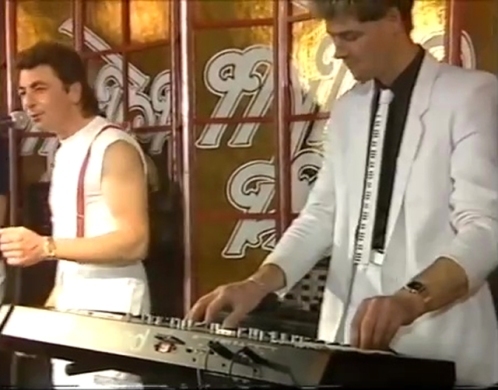
Final round’s a one-minute speed quiz, with two man/woman pairings; one team pushing a bell, the other a high-pitched noise which really startles the older chap from Clifton when they demonstrate it. Questions are like “how do you know The Queen is at home?” and once again it’s Clifton, taking the entire final, as the place erupts into jumper-clad arms maniacally punching at the ceiling. Langsford gets wolf-whistled at the trophy presentation — perhaps by a young Eamonn Holmes — and the winning team flood the stage, arm wrestling champ puffing on a roll-up, with a plastic novelty hat perched on his massive head. Between this and Fred Trueman’s lot, if pubs were like this all the time, I might go in one.
…
This piece first appeared on my Patreon, where subscribers could read it a month before it landed here. If you’d like to support me for as little as £1 a month, then click here to help provide the world with regular deep dives about weird-bad pop culture, early access to my videos, my podcast, and all kinds of other stuff.
There’s a ton of content, including exclusives that’ll never appear here on the free blog, such as 1970’s British variety-set horror novella, Jangle, and my latest novel, Men of the Loch. Please give my existing books a look too, or if you’re so inclined, sling me a Ko-fi or some PayPal cash.



